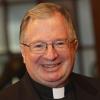Pope Francis' remarks about armed intervention in Iraq has Catholic commentators fully occupied trying to explain the nuances of the church's position on humanitarian intervention. In an Aug. 9 letter, the Holy Father asked U.N. Secretary General Ban Ki-moon for immediate action "to take action to end the humanitarian tragedy now underway" in northern Iraq.
But on his return flight from South Korea, Pope Francis declined to endorse the U.S. intervention against the Islamic State. He complicated the problem further by affirming that no single nation could decide to intervene on its own.
There seems, moreover, to be a Vatican two-step with the pope articulating the (ideal) principles while leading nuncios seem to voice approval for intervention. "Asked about the airstrikes Aug. 11," wrote Catholic News Service reporter Francis X. Rocca, "Archbishop Giorgio Lingua, the Vatican nuncio to Iraq, told Vatican Radio: 'This is something that had to be done, otherwise [the Islamic State] could not be stopped.'" The pope deals in principles; the nuncios deal with the politics.
Factually, any imputation that the U.S. intervened in northern Iraq unilaterally is misleading, as the U.S. took action in response to a legal request from the Iraqi government. Such bilateral arrangements are envisaged by the Responsibility to Protect. But the question persists: May one nation intervene unilaterally in another to prevent a humanitarian catastrophe?
Beginning in 2005, it seemed the mechanism for U.N.-approved humanitarian intervention was in place with the U.N.'s adoption of the principle of the Responsibility to Protect. But the U.N. never strengthened its peacekeeping arm to meet such problems, and the comity among the Security Council's five permanent members, which seemed to promise council approval for interventions, quickly disappeared.
The Holy See's position against unilateral intervention is wise, and the requirement of Security Council approval is more than prudent. It is a necessary condition of world order. The 2003 U.S. invasion of Iraq is an object lesson in why unilateral intervention needs to be opposed. But does anyone reasonably believe that the Islamic State attacks on Christians, Yezidis and other Iraqi minorities could have been turned back without U.S. action?
In the absence of international authority and international capacity to provide protection to threatened minorities, what moral sense are we to make of unilateral initiatives "to disarm the aggressor," like the U.S. and European (France, U.K., E.U.) actions against the Islamic State in Iraq?
We must acknowledge that the conditions of world order we desire in principle are not the de facto conditions of the world we live in. U.N. agencies like the World Food Program and the High Commissioner for Refugees can relieve the distress of the victims, but they cannot protect and defend them. Only national sources and multilateral coalitions can do so. And in fact, it is primarily the U.S. that has the military and logistical capacity to respond to genocidal threats like those presented by the Islamic State.
Like all nations, the U.S. shares in the responsibility to protect, but in a paramount way, it possesses the intelligence resources to probe affected areas and the military resources to respond to humanitarian disasters in far-off places.
St. John Paul II's language about humanitarian intervention as "a duty for nations and for the international community" (emphasis mine) is helpful here. When the international community is hamstrung to make an urgently needed response, individual nations or groups of nations still bear the responsibility to protect, especially if they have the capacity to intervene. Authority to act may be said to devolve to single states or coalitions of states with the capacity and the political will to intervene.
The Vatican's two-step on the Iraqi intervention is warranted by the Vatican's desire to engage diplomatically at the same time as it upholds the church's teaching and international law. All the same, it would make for clearer teaching, a more coherent diplomatic policy and better guidance to world leaders to make a fuller and more consistent explanation of the church's entire politico-moral position. That is, the church should explain the exceptional logic by which the Responsibility to Protect can be exercised when there is lack of international capacity and an absence of responsible international authority.
In the long term, the international system must be strengthened with adequate Responsibility to Protect enforcement capacity and a more responsive authorization process to replace the veto-hampered Security Council system. Then there will be no need to appeal to a moral logic for exceptional circumstances. In the interim, clarity about moral reasoning in our less than ideal world is necessary.
[Jesuit Fr. Drew Christiansen is former editor of America magazine and a professor of ethics at Georgetown University.]



